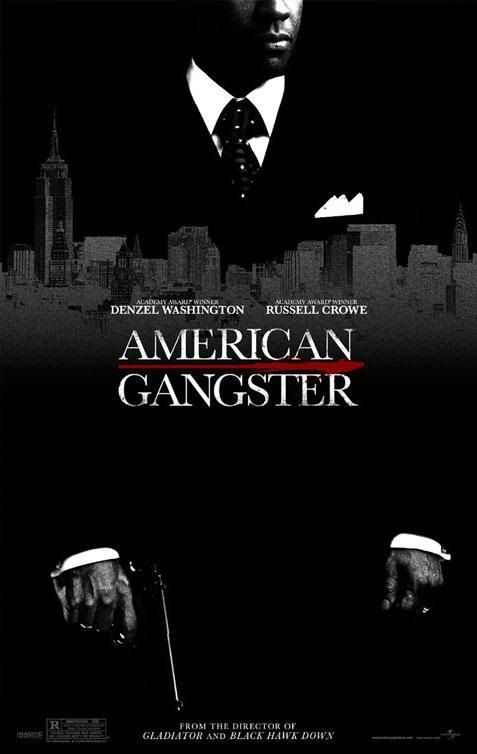
After seeing "30 Days of Night" and "Saw IV" I've found myself weary of the movie theater. Distracted by my misgivings for two of the worst movies of the year, I almost passed on the opportunity to see “American Gangster.” Having already given up one opportunity I decided ignoring the talents of artists like Ridley Scott, Russell Crowe and Denzel Washington was borderline stupidity. After watching the nearly three-hour event I realized it was stupidity and laziness, not fear, which persuaded me to postpone this movie for over a week. How obvious is it for me to say that it’s a good year for gang/mob movies?
Washington’s and Crowe’s characters (Frank Lucas and Richie Roberts, respectively) start the film off with two different stories and well set-up contrasts of one another. Frank Lucas was nothing but a driver for a leading crime boss, but once his mentor dies he decides to find his own way to the top. In an arousing success story, Lucas claims the American Dream with business-like prowess. His success becomes an accessory for greed that leads to his downfall. Richie Roberts, in contrast, tries to make it to the top of his work through honesty. Trying to be the best cop/detective he can, he accepts his inability to father his child and focuses on taking down the larger drug-lords of Manhattan, namely Frank Lucas.
Ridley Scott may be one of the all-time greatest film directors of the last decade. He has somehow maintained the classic atmosphere of what made Hollywood films great in the first place. He ignores the “New Hollywood” syndrome of cutting down a movie for those with short attention spans and refuses to make a vulgar movie in language and violence just for the sake of it. Everything that takes place in this film is appropriate for the situation and nothing is dumbed down for the MTV crowd.
The aforementioned audience was probably expecting Denzel and Crowe to engage in a bloody gunfight amidst the streets of Manhattan. No, the real showdown between these two actors is one of ingenuity and respect. When Crowe and Washington come face to face for the very first time in the film, the two actors dared not to show each other up, but rather utilize their characters in what I like to call an “Acting Showdown.” A good example of this can be seen between Gene Hackman and Dustin Hoffman in the restroom scene of “Runaway Jury.” Or perhaps Jodie Foster and Anthony Hopkins during the scene where Clarice tells her story of the lambs in “Silence of the Lambs.” The actors are not trying to upstage the other, but they feed off of one another’s talent. As so, Russell Crowe and Denzel Washington hold nothing back and their “coffee” scene is one of the best moments of acting I’ve seen this year.
Scott has the steady hand every director should aspire to have. Every scene in the film feels like hours of thought was put in to it and the result is like reading a finely constructed book. The movie plays out as if it’s in chapters. When the chapter feels like it’s beginning to sag, the film turns the page to the next chapter that moves the characters to a new faze of the story. And make no mistake it is an epic story.
Ridley Scott has manipulated a very complex telling on the phrase, “what goes up must come down.” I don’t know who first said that, but it applies here. Frank Lucas is something of a tragic success story. He is a strict businessman who knows how to act, knows how to dress and knows how to influence others. He doesn’t adopt the ghetto-gangster look that so many of his business adversaries have. He’s a brilliant man, but one who didn’t know to quit while he was ahead. Comparatively, Richie tries hard to play the good-cop, but this story vividly shows that “good-cop” does not equal “good person.” Richie is plagued with the curse of only knowing how to do his job superbly at all times. For example, he finds a substantial amount of money and is constantly looked down upon for turning it in instead of keeping it. On the other hand he makes dry promises to his ex-wife and son. His life is something of a tragedy as well.
What it comes down to is that nothing is perfect. Despite all the opportunities America provides a single individual, “American Gangster” solidifies the fact that every route to any sort of success has its flaws—no matter who you are. Frank is actually a more likable person than Richie, but what does that mean? Clearly nothing as Frank is the one who has brought drugs to the country, killed people and bribed all of Manhattan. Richie isn’t very social and is bad at pleasing his family, but he’s the one who works so hard to take down criminals and keep people safe. The paradox of these characters and the end result of what they’ve worked so hard to accomplish is probably the most intriguing aspect of the film.
So “American Gangster” stands very tall among the weak year of films we’ve seen fly by. I probably enjoyed “Eastern Promises” more due to its poetic nature and originality, but even though “American Gangster” isn’t altogether original it posts a benchmark for what Hollywood films should aspire to be today. It is a potentially unknown story made in to an epic character story without looking overdramatic. Sure, Ridley Scott has made far more revolutionary films in the past, but the quality of his features has not wavered.
**** out of ****



No comments:
Post a Comment